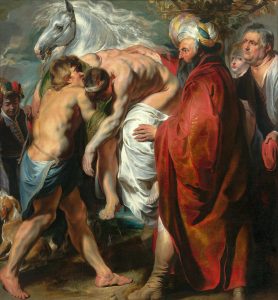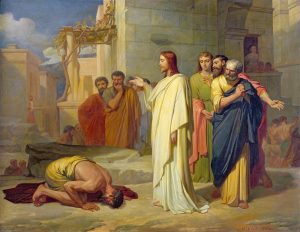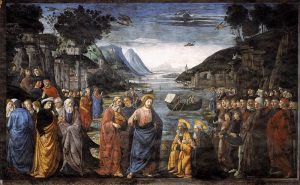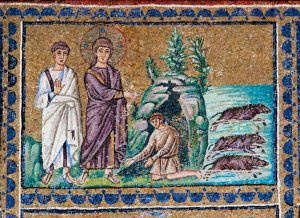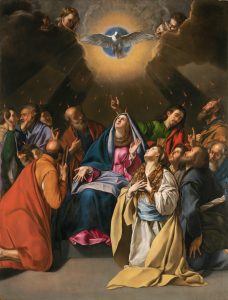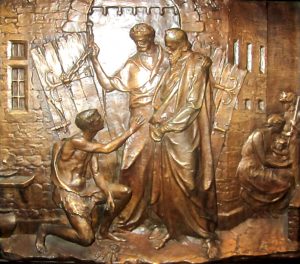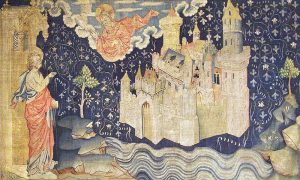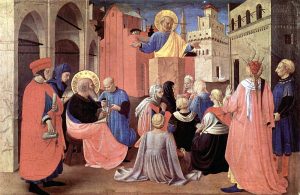Illuminations on the Lectionary readings for July 20, 2025 (Pentecost 6C/Proper 11)
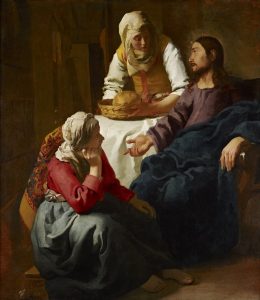
Christ in the house of Mary and Martha. Oil painting by Johannes (Jan) Vermeer, 1665, National Gallery of Scotland.(Click image to enlarge.)
First Reading (Track One): Amos 8:1-12
What does hospitality look like? How should it be practiced? In the Gospel story of Mary and Martha, which sister gets hospitality right? In subtle ways, Sunday’s Lectionary readings build toward this Gospel. In our Track One first reading, the prophet Amos builds on the theme of last week’s passage: He recites a horrifying litany of curses that will come to the land whose rulers “trample the needy and bring to ruin the poor.” If they continue to treat their subjects inhospitably, he says, their sun will go dark and their crops will fail. The nation will hunger and thirst for God’s words as it will for food and water.
First Reading (Track Two): Genesis 18:1-10a
Sunday’s Track Two first reading tells of God assuring Abraham and Sarah that they will have a son, despite Sarah’s advanced age, fulfilling God’s pledge that their children would inherit the Promised Land. We learn of this promise, however, in the context of Abraham’s radical hospitality to three visiting strangers. Who are these strangers? God? Angels? That’s not entirely clear, but it doesn’t matter: Abraham is generous to the strangers, and Abraham becomes patriarch of God’s chosen people.
Psalm: (Track One): Psalm 52
Harmonizing with the Track One first reading, the Psalmist angrily calls out a tyrant (Doeg the Edomite, who conspired with Saul to kill King David, according to the small print at the top of Psalm 52 in the New Revised Standard Version). We hear accusation in every line: This was a tyrant who trusted in great wealth; a liar, who loved evil more than good. The Psalmist shouts: Oh, that God would demolish you utterly! Wicked people who steal from the poor will fail, while those who trust in God’s eternal mercy will live in joy.
Psalm: (Track Two): Psalm 15
Who may come to the holy hill and reside in God’s tabernacle? Such a privilege must be earned, the Psalmist sings. It should come as no surprise that, when we pare this psalm down to its essentials, we get another lesson in hospitality and love of neighbor: Do what is right. Don’t slander. Don’t do wrong by our friends or harm the innocent. These are simple commands, and they guide us into a life of righteousness.
Second Reading: Colossians 1:15-28
Most of the letters of Paul and many of the later letters written by followers in Paul’s name were written to guide specific Christian communities; to advise and to teach. They are like sermons in writing. Listen for this tone in Sunday’s excerpt from the letter to the Colossians: After a theological meditation on Christ as the image of the invisible God who made peace through his sacrifice, the writer tells us that he first became a servant of the gospel, a servant of the church. As a servant, he sounds a lot like Martha in Sunday’s Gospel. And then he advises us to reconcile ourselves to Christ and proclaim Christ’s supremacy, a worshipful approach that might make us think of Mary.
Gospel: Luke 10:38-42
When Jesus arrives at their home in Bethany, Mary and Martha both show hospitality, each in her own way. Martha welcomes Jesus by getting busy with the many tasks involved with serving their guest. Mary simply sits at Jesus’s feet – an act that might have been considered highly inappropriate for a woman in the culture of that time and place. Martha, on the other hand, gets busy preparing hospitality for their visitor. This should be a right and proper thing to do; yet she remains worried and distracted, angry with her sister. In fact, Jesus says, “Mary has chosen the better part, which will not be taken away from her.” She showed hospitality in her own way, dropping everything to listen to Jesus, their guest.

